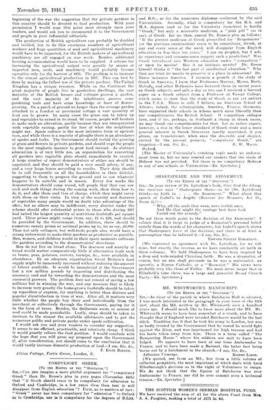SHAKESPEARE AND THE ATONEMENT.
(To THE EDITOR. OT THE " SPECTATOR."] SIR,—In your review of Dr. Lyttelton's book, Giro God the Glory, the reviewer says " Shakespeare shows—so he [Dr. Lyttelton] thinks—no faith in . . . the Atonement." What about this speech of Isabel's to Angelo (Measure for Measure, Act II., Scene ii.)?- " Why, all the souls that were, were forfeit once, And He that might the vantage best have took Found out the remedy."
Do not these words point to the doctrine of the Atonement? I submit that it is inept to judge of a dramatist's personal belief merely from.the words of his characters, but Isabel's speech shows that Shakespeare knew of the doctrine, and there is at least a presumption that he believed it.—I am, Sir, &c.,
EDWARD STANLEY ROBERTSON.
[We expressed no agreement with Dr. Lyttelton, for we felt none, but exactly the reverse, as we have constantly set forth in these columns. We hold Shakespeare to have been inspired by a deep and wide-minded Christian faith. He was a dramatist, of course, but no one shall persuade us he was a materialist, an agnostic, a Roman Catholic, or a " Brownist." His' views were probably very like those of Fuller. We must never forget that in Elizabeth's time there was a large and powerful Broad Church Party.—ED. Spectator.]


































 Previous page
Previous page